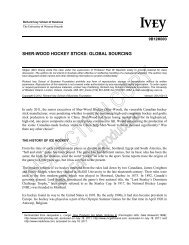foundation of canada asia pacific - Content Tagged with
foundation of canada asia pacific - Content Tagged with
foundation of canada asia pacific - Content Tagged with
You also want an ePaper? Increase the reach of your titles
YUMPU automatically turns print PDFs into web optimized ePapers that Google loves.
government’s Youth International Internship Program. This experience provides a key<br />
ingredient needed in developing business in Asia — an understanding <strong>of</strong> local practices.<br />
54<br />
In all Asian countries, business is done differently than in Canada, whether in jurisdictions<br />
like Hong Kong, Singapore, Malaysia or India that have legal systems like our own, based<br />
on British common law, or in China or Vietnam, where business relationships are still<br />
largely governed by political influence. It is essential for companies trading in any <strong>of</strong><br />
these economies to have an insight into both the society and the business culture. While<br />
companies operating in Asia recognize that markets are different from those in Canada,<br />
and always value local market expertise, there has <strong>of</strong>ten been a failure to accept the<br />
need for an understanding <strong>of</strong> the broader environment in which business is carried on.<br />
Few Canadian businesses operate beyond our own borders, and most that do never<br />
venture beyond the US. Of the estimated 2.5 million businesses in Canada, 1 about 99%<br />
have fewer than 100 employees. Of these small companies, less than 7% trade or<br />
manufacture outside North America. 2 In the past, if business owners themselves did not<br />
have experience outside North America, they seemed to have a limited recognition <strong>of</strong><br />
the need for Asian expertise, other than possibly the usefulness <strong>of</strong> local language skills.<br />
With the great influx <strong>of</strong> Asian immigrants in the past decade, a better understanding <strong>of</strong><br />
the cultural dimensions <strong>of</strong> doing business has emerged, at least in the major immigrant<br />
centres <strong>of</strong> Toronto, Vancouver and Montreal. Managers have begun to turn to Asian<br />
Canadians for the extra business expertise they feel they need. However, there seems to<br />
be a widespread misconception about the business skills and connections <strong>of</strong> young Asian<br />
Canadians who have spent most <strong>of</strong> their lives in Canada. As a result, there is a feeling<br />
among at least some locally educated Asian Canadians that they are being pushed into<br />
“Asian expert” roles for which they are not always qualified. Meanwhile, those graduates<br />
who have purposely acquired Asian skills find themselves overlooked by Canadian employers,<br />
both at home and abroad. In a series <strong>of</strong> focus groups organized across Canada last year,<br />
the Asia Pacific Foundation found a surprising number <strong>of</strong> Asian Canadians under the age<br />
<strong>of</strong> 40 who felt they were valued by employers mostly as links to Asian business networks<br />
rather than for the skills they had acquired through years <strong>of</strong> study. 3 They believed this<br />
limited their career opportunities.<br />
HIDDEN ADVANTAGE REVISITED<br />
Six years ago, in a report titled Canada’s Hidden Advantage, the Asia Pacific Foundation<br />
pointed to the failure by many Canadian firms to take advantage <strong>of</strong> the business skills<br />
and connections <strong>of</strong> newly arrived Asian immigrants. 4 The lack <strong>of</strong> Canadian background<br />
and experience <strong>of</strong> these new entrants into our work force was seen by employers as a<br />
barrier to their recruitment to responsible positions, even if they had proven their<br />
business skills overseas. As a result, businesses were missing out on the chance to build<br />
on these connections to develop new markets.<br />
In the years since that report was published, there are signs that business is more widely<br />
recognizing the value <strong>of</strong> Asian immigrants as a bridge into Asian markets, both foreign<br />
and domestic. Many Asian business immigrants have established themselves as consultants,<br />
selling their expertise or connections in various Asian economies. However, the report



